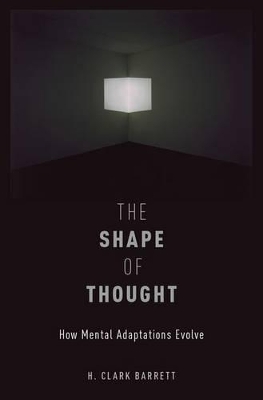
The Shape of Thought
Oxford University Press Inc (Verlag)
978-0-19-934831-2 (ISBN)
The Shape of Thought: How Mental Adaptations Evolve presents a road map for an evolutionary psychology of the twenty-first century. It brings together theory from biology and cognitive science to show how the brain can be composed of specialized adaptations, and yet also an organ of plasticity. Although mental adaptations have typically been seen as monolithic, hard-wired components frozen in the evolutionary past, The Shape of Thought presents a new view of mental adaptations as diverse and variable, with distinct functions and evolutionary histories that shape how they develop, what information they use, and what they do with that information.
The book describes how advances in evolutionary developmental biology can be applied to the brain by focusing on the design of the developmental systems that build it. Crucially, developmental systems can be plastic, designed by the process of natural selection to build adaptive phenotypes using the rich information available in our social and physical environments. This approach bridges the long-standing divide between "nativist" approaches to development, based on innateness, and "empiricist" approaches, based on learning. It shows how a view of humans as a flexible, culturally-dependent species is compatible with a complexly specialized brain, and how the nature of our flexibility can be better understood by confronting the evolved design of the organ on which that flexibility depends.
H. Clark Barrett is an evolutionary anthropologist who studies the evolution of cognition. For the past fifteen years he has conducted field work in the Amazon region of Ecuador, and uses experimental cognitive tasks across cultures to test hypotheses about the evolution of the mind. He is now Professor of Anthropology at the University of California, Los Angeles.
Acknowledgments ; Introduction: The problem ; Part 1. Evolution ; 1 - Additivism ; 2 - Hill-climbing ; Part 2. Information ; 3 - Adding value ; 4 - Social ontology ; 5 - Minds ; Part 3. Development ; 6 - Development ; 7 - Open ends ; Part 4. Culture ; 8 - Moving targets ; 9 - Culture ; 10 - Accumulation ; Part 5. Architecture ; 11 - Parts ; 12 - Wholes ; 13 - Us ; Conclusion: Possibilities ; References ; Index
| Erscheint lt. Verlag | 12.3.2015 |
|---|---|
| Reihe/Serie | Evolution and Cognition Series |
| Verlagsort | New York |
| Sprache | englisch |
| Maße | 231 x 155 mm |
| Gewicht | 522 g |
| Themenwelt | Geisteswissenschaften ► Psychologie ► Allgemeine Psychologie |
| Geisteswissenschaften ► Psychologie ► Verhaltenstherapie | |
| Naturwissenschaften ► Biologie ► Humanbiologie | |
| Sozialwissenschaften ► Ethnologie | |
| Sozialwissenschaften ► Soziologie | |
| ISBN-10 | 0-19-934831-6 / 0199348316 |
| ISBN-13 | 978-0-19-934831-2 / 9780199348312 |
| Zustand | Neuware |
| Haben Sie eine Frage zum Produkt? |
aus dem Bereich


